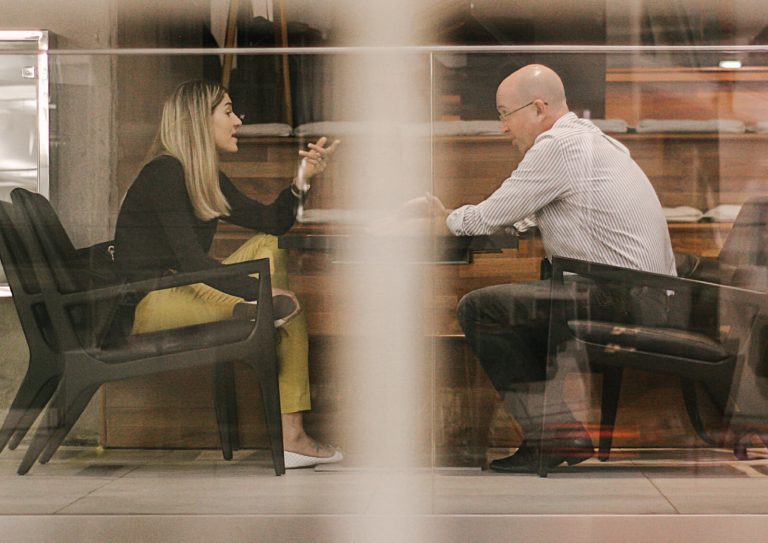When I first heard about the Accidental Counsellor course, I wondered if it could apply to me.
Designed for those who aren’t trained counsellors but may find themselves in that position, Accidental Counsellor programs have usually been marketed to people in customer-facing roles like teachers, nurses, emergency personnel, hairdressers, front-of-house staff and those who work in call centres.
I work in corporate communications, so I’m not exactly working on the frontline. However, someone quickly pointed out to me that we’re all put in unofficial counselling positions often. A friend made redundant, a colleague grieving a loved one, or sibling reeling from a breakup.
With that, I signed up for Accidental Counsellor and walked away with a bunch of helpful tips that I bring to my everyday relationships.
#1: Name your emotions – and be ok with the discomfort
To kick off the course, each participant shared how they were feeling that morning from 1 to 10 and why.
While we were mostly strangers, it was interesting to share vulnerably and not be expected to ‘make it better’. Instead, the activity focused on building awareness and empathy for what others might be going through.
By identifying our emotions, we can be more clued into when we can give more and when to scale back.
#2: How do we feel about silence?
For me, silence is not golden. Did I say something wrong? Are they not having a good time? How can I make this better?
While I know some of this is irrational, I was prompted to consider if filling the silence is to help me instead of someone else.
Sometimes, silence can help others – giving them time to think and work out what they need.
#3: You can hug people with your eyes
Have you ever had someone share something upsetting and you want to give them a giant hug? Except it might be a client, someone in your workplace, or they’re just not a hugger.
That’s perfectly okay and rather than compromising their boundaries, you can bring the quality of a hug into how you actively listen and respond.
#4: It’s normal to run low on empathy – just be aware
One of the participants shared an all-too-common scenario: she works in customer service and spends most of her time listening to others and helping people solve their problems. She’s attentive, kind and patient.
At home, when her partner laments about work problems, she struggles to pay attention. It almost feels like she’s ‘run out’ of empathy.
Our facilitator, a trained counsellor, explained many people struggle to show empathy in certain relationships, including close friends, parents, siblings and partners.
This isn’t a bad thing or makes us a bad person, but we have to be aware of it and communicate openly with our loved ones.
#5: “What’s the hardest part?”
It’s a simple question, but it can be helpful to ask when someone is feeling overwhelmed and facing multiple issues or emotions.
Asking the hardest part is a grounding question that can cause them to reflect and deepen your understanding of what they’re experiencing.
#6: You don’t have to use the right language
When someone shares what they’re struggling with, some people can turn themselves inside out to say the ‘right’ thing.
It’s ok not to have the perfect words and, depending on who it is, you can language as simple as “that sucks” or “this must be really hard for you”.
Most importantly, use language that is authentically ‘you’.
#7: Watch out for empathy blockers
While we shouldn’t strive for a ‘perfect’ response, there are some things we can avoid when supporting someone. Empathy blockers are tactics or responses we might use that distract from the emotions, instead of feeling empathy for someone. They include:
- Trying to fix the problem or giving advice
- Sharing when something similar happened to you
- Finding a positive spin or silver-lining the situation
- Philosophising (a.k.a. everything happens for a reason)
As a group, we discussed 14 different empathy blockers, so there’s plenty to learn.
Since doing the course, I’ve noticed myself about to give advice or feeling uncomfortable in silence, and I’ve been able to recall the tips from Accidental Counsellor.
The framework we were given has taken a weight off my shoulders. Instead of constantly trying to fix issues, I funnel my energy into actively listening and being present for those I care about.
Whether you’re looking to bring these skills into your professional life or personal relationships, I can assure you that you’ll walk away with a toolbox of easy and actionable insights.
To learn more about Accidental Counsellor, how it might help you, and when it’s next available, you can find out more or get in touch on our website.
Related Services & Workshops

Accidental Mediator
Accidental Mediator is a training workshop that gives your team the skills and confidence to effectively resolve conflict, tensions and misunderstandings in the workplace.

Effective Online Group Leadership
This workshop will help group leaders develop skills to facilitate creative online group work.

Accidental Counsellor
Accidental Counsellor is a workshop to assist people who aren’t trained counsellors, but often find themselves in a counselling role “by accident”. You’ll learn how to support clients, friends, family, colleagues, and strangers in distress or experiencing a crisis.






